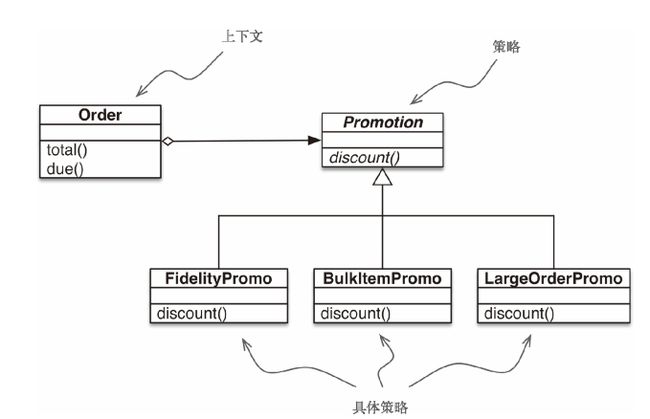Fluent Python - Part6 使用一等函数实现设计模式
符合模式并不表示做得对
--- Ralph Johnson
虽然设计模式与语言无关,但这并不意味着每一个模式都能在每一门语言中使用。案例分析: 重构“策略”模式
《设计模式:可服用面向对象软件的基础》一书是这样概述“策略模式”的:定义一系列算法,把他们一一封装起来,并且使它们可以相互替换。本模式使得算法可以独立于使用它的客户而变化。
一个例子
假如一个网店制定了下述折扣规则。
- 有 1000 或以上积分的顾客,每个订单享 5% 折扣。
- 同一订单中,单个商品的数量达到 20 个或以上,享 10% 折扣。
- 订单中的不同商品达到 10 个或以上,享 7% 折扣。
简单起见,我们假定一个订单一次只能享用一个折扣。
“策略”模式的UML类图如上,其中涉及下列内容。
- 上下文:把一些计算委托给实现不同算法的可互换组件,它提供服务。在这个实例中,上下文是 Order, 它会根据不同的算法计算促销折扣。
- 策略: 实现不同算法的组件共同的接口。在这个示例中,名为 Promotion 的抽象类扮演这个角色。
- 具体策略: “策略”的具体子类。 fidelityPromo, BulkPromo 和 LargeOrderPromo 是这里实现的三个具体策略。
from abc import ABC, abstractmethod
from collections import namedtuple
Customer = namedtuple('Customer', 'name fidelity')
class LineItem:
def __init__(self, product, quantity, price):
self.product = product
self.quantity = quantity
self.price = price
def total(self):
return self.price * self.quantity
class Order: # 上下文
def __init__(self, customer, cart, promotion=None):
self.customer = customer
self.cart = list(cart)
self.promotion = promotion
def total(self):
if not hasattr(self, "__total"):
self.__total = sum(item.total() for item in self.cart)
return self.__total
def due(self):
if self.promotion is None:
discount = 0
else:
discount = self.promotion.discount(self)
return self.total() - discount
def __repr__(self):
fmt = ''
return fmt.format(self.total(), self.due())
class Promotion(ABC):
@abstractmethod
def discount(self, order):
"""返回折扣金额(正值)"""
class FidelityPromo(Promotion): # 第一个具体策略
"""为积分为1000或以上的顾客提供5%折扣"""
def discount(self, order):
return order.total() * .05 if order.customer.fidelity >= 1000 else 0
class BulkItemPromo(Promotion): # 第二个具体策略
"""单个商品为20个或以上时提供10%折扣"""
def discount(self, order):
discount = 0
for item in order.cart:
if item.quantity >= 20:
discount += item.total() * .1
return discount
class LargeOrderPromo(Promotion): # 第三个具体策略
"""订单中的不同商品达到10个或以上时提供7%折扣"""
def discount(self, order):
distinct_items = {
item.product for item in order.cart}
if len(distinct_items) >= 10:
return order.total() * .07
return 0
joe = Customer('John Doe', 0)
ann = Customer('Ann Smith', 1100)
cart = [LineItem('banana', 4, .5),
LineItem('apple', 10, 1.5),
LineItem('watermellon', 5, 5.0)]
print(Order(joe, cart, FidelityPromo()))
print(Order(ann, cart, FidelityPromo()))
banana_cart = [LineItem('banana', 30, .5),
LineItem('apple', 10, 1.5)]
print(Order(joe, banana_cart, BulkItemPromo()))
long_order = [LineItem(str(item_code), 1, 1.0) for item_code in range(10)]
print(Order(joe, long_order, LargeOrderPromo()))
print(Order(joe, cart, LargeOrderPromo()))
"""output
"""
使用函数实现“策略”模式
from abc import ABC, abstractmethod
from collections import namedtuple
Customer = namedtuple('Customer', 'name fidelity')
class LineItem:
def __init__(self, product, quantity, price):
self.product = product
self.quantity = quantity
self.price = price
def total(self):
return self.price * self.quantity
class Order: # 上下文
def __init__(self, customer, cart, promotion=None):
self.customer = customer
self.cart = list(cart)
self.promotion = promotion
def total(self):
if not hasattr(self, "__total"):
self.__total = sum(item.total() for item in self.cart)
return self.__total
def due(self):
if self.promotion is None:
discount = 0
else:
discount = self.promotion(self)
return self.total() - discount
def __repr__(self):
fmt = ''
return fmt.format(self.total(), self.due())
def fidelity_promo(order):
"""为积分为1000或以上的顾客提供5%折扣"""
return order.total() * .05 if order.customer.fidelity >= 1000 else 0
def bulk_item_promo(order):
"""单个商品为20个或以上时提供10%折扣"""
discount = 0
for item in order.cart:
if item.quantity >= 20:
discount += item.total() * .1
return discount
def large_order_promo(order):
"""订单中的不同商品达到10个或以上时提供7%折扣"""
distinct_items = {
item.product for item in order.cart}
if len(distinct_items) >= 10:
return order.total() * .07
return 0
joe = Customer('John Doe', 0)
ann = Customer('Ann Smith', 1100)
cart = [LineItem('banana', 4, .5),
LineItem('apple', 10, 1.5),
LineItem('watermellon', 5, 5.0)]
print(Order(joe, cart, fidelity_promo))
print(Order(ann, cart, fidelity_promo))
banana_cart = [LineItem('banana', 30, .5),
LineItem('apple', 10, 1.5)]
print(Order(joe, banana_cart, bulk_item_promo))
long_order = [LineItem(str(item_code), 1, 1.0) for item_code in range(10)]
print(Order(joe, long_order, large_order_promo))
print(Order(joe, cart, large_order_promo))
"""output
"""
选择最佳策略:简单的方式
方式一:迭代一个函数列表,并找出折扣额度最大的
promos = [fidelity_promo, bulk_item_promo, large_order_promo]
def best_promo(order):
"""选择可用的最佳折扣"""
return max(promo(order) for promo in promos)
这种方式简单明了,而且易于读写,但是有些重复可能会导致不易察觉的缺陷:若想添加新的促销策略,要定义相应的函数,还要记得把它添加到promos列表中,否则,当新促销函数显式地作为参数传给Order时,它是可用的,但是 bset_promo 不会考虑它。
继续往下读!
方式二:找出模块中的全部策略
在 Python 中,模块也是一等对象,而且标准库提供了几个处理模块的函数。Python文档是这样说明内置函数globals的。
global(): 返回一个字典,表示当前的全局符号表。这个符号表始终针对当前模块(对函数或方法来说,是指定义它们的模块,而不是调用它们的模块)
promos = [globals()[name] for name in globals() if name.endswith('_promo') and name != 'best_promo']
def best_promo(order):
"""选择可用的最佳折扣"""
return max(promo(order) for promo in promos)
收集所有可用促销的另一种方法是,在一个单独的模块中保存所有策略函数,把 best_promo 排除在外。
promos = [func for name, func in inspect.getmembers(promotions, inspect.isfunction)]
def best_promo(order):
return max(promo(order) for promo in promos)
inspect.getmembers 函数用于获取对象(这里是promotions模块)的属性,第二个参数是可选的判断条件(一个布尔值函数)。我们使用的是 inspect.isfunction, 只获取模块中的函数。
不管怎么命名策略函数,该方式都可用,唯一重要的是 promotions 模块只能包含计算订单折扣的函数。当然,这是对代码的隐性假设。如果有人在 promotions 模块中使用不同的签名定义函数,那么 best_promo 函数尝试将其应用到订单上时会出错。
动态手机促销折扣函数更为显式的一种方案是使用简单的装饰器,下一章我们将会介绍这种方式。
又又又写完一章了,奥利给!
